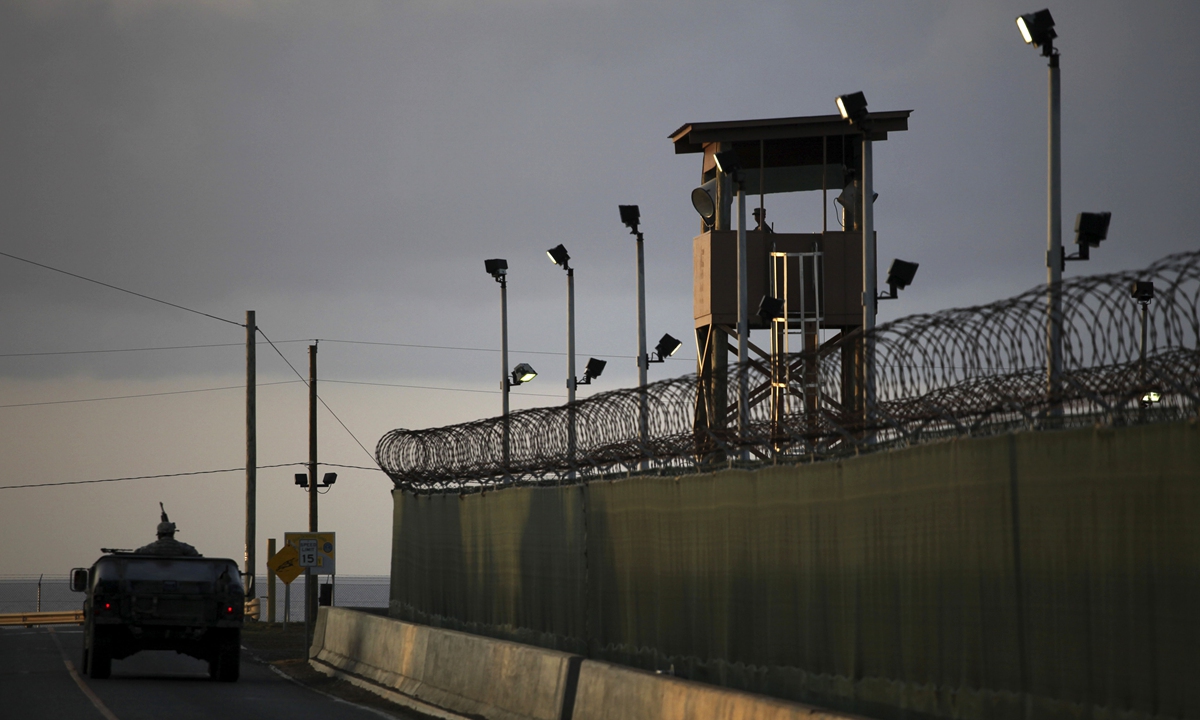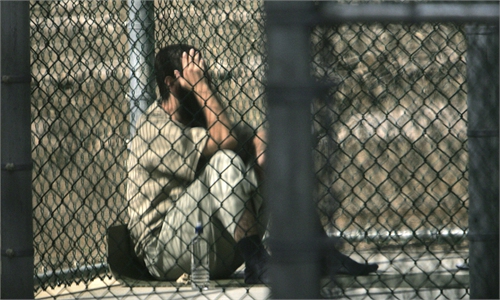
The detention facility on Guantanamo Bay US Naval Base Photo: VCG
On 11 January 2002, the US military began detaining captives of its Global War on Terror (GWOT) at Guantanamo Bay, Cuba, starting one of the longest and darkest chapters of its abusive treatment of terrorist suspects. In the years to come, hundreds of foreign Muslim men, and even boys, would be secretly detained, denied due process, and subjected to physical and psychological abuses, some of which amount to torture.According to The New York Times, as of July 2022, the US has imprisoned 780 men and boys - all Muslim - at Guantanamo since the 9/11 attacks, many of whom were later determined to have little or no connection with al-Qaeda. Nine have died at the facility. Although President Obama ordered its close within one year in 2009, 36 remain detained.
Since the beginning, Guantanamo has been an arrangement that aims to circumvent both domestic and international legal supervision. To start with, a detention site located at a US navy base on foreign soil provides the convenience of complete US jurisdiction and control while avoiding the unpleasantness of any domestic legal oversight.
Back then, the Bush administration labeled detainees there as "unlawful combatants", a newly coined term, rather than the traditional "prisoners of war (POWs)". This labeling tactic gives the US discretion to decide how these detainees would be treated. Because the US, one of the 196 states that have ratified the Geneva Conventions of 1949, is bound to guarantee POWs a minimum standard of care, including safe accommodation, adequate food and medical attention, as well as immediate release and repatriation after the cessation of active hostilities. States are required by these conventions to offer the International Committee of the Red Cross (ICRC) access to detainees and prohibited from exposing POWs to violence, torture or cruel treatment.
"Unlawful combatants", a term undefined in the Geneva Conventions or any other treaties, are therefore not guaranteed the above-mentioned legal protection. With the authorization of the US administration and the military, the Central Intelligence Agency (CIA) later created and subjected numerous detainees to the so-called "enhanced interrogation techniques" such as beating, sleep and food deprivation, extreme noise, isolation, severe cold, sexual humiliation, stress position, mock drowning, waterboarding and walling.
For over two decades, Guantanamo Bay has been at the center of controversy. It stands as a haunting monument to human rights violations by the US on the grounds of national security. Through Guantanamo, the US suggests to the world that it is acceptable to sideline human rights and humane treatment of detainees in the name of countering terrorism.
More than two decades on, many in the US still know little of the details of the systemic abuses carried out by the CIA and US military against these foreign Muslims, for reasons.
To start off, successive US administrations have connived at these wrongdoings and chosen to cover up this moral low ground in its war on terror. Only people cleared by the Pentagon can fly to the heavily guarded base. Proceedings from Guantanamo's military commissions, a flawed system to persecute prisoners at the base, have never been publicly broadcasted. And transparency requests from media and activist groups have been resisted on the grounds that non-public information is classified.
The Bush administration tried to block federal courts from reviewing Guantanamo cases. In the face of mounting domestic pressure, the Obama administration reviewed the legal status of each detainee, but concluded that the detainees could continue to be held under the laws of war and not treated as POWs. In 2014, the Senate Intelligence Committee only released a heavily redacted summary of its 2014 report on the CIA torture program.
The current administration has no intention to release the full Senate report, much less criminally investigate those responsible for creating, authorizing, or implementing the CIA's secret detention and torture program. Like the previous ones, it also opposes allowing the International Criminal Court to include abuses by US nationals in its investigation on grave human rights crimes in Afghanistan.
Besides, popular culture in the US has often soft-pedaled and glorified the cruelty and failure of these measures. For example, the 2012 Hollywood blockbuster movie Zero Dark Thirty and the 2019 Interrogation exhibit at the International Spy Museum in Washington, DC trivialized the abuses inflicted on suspects and went so far as to suggest, erroneously, that torture worked.
Guantanamo is hardly the only scourge from the US war on terror. Its counterterrorism campaign has spread to 85 countries with scant transparency or oversight. Brown University's Costs of War Project found out that with the participation of US allies, the CIA secretly and extrajudicially transferred at least 119 foreign Muslims from one foreign country to another for incommunicado detention and harsh interrogation at various CIA black sites. The US military also held thousands of foreign Muslim security detainees and POWs - including women and boys - at its detention centers abroad including Abu Ghraib in Iraq and Bagram Air Base in Afghanistan, subjected many to physical and psychological abuse, and denied them access to lawyers and right to challenge the basis for their imprisonment.
Despite the controversy, the US has continued its cruel and inhumane practices against terrorism suspects to this day, transferring them to US-run sites overseas where they are subject to torture.
It is deeply disheartening to see a country that has been so central to the drafting of core international human rights instruments breaking its commitments. Before Guantanamo turns 21, bold steps need to be taken to reverse the course.
Truth needs to be told. Justice needs to be upheld. Wrongs need to be made right. Those responsible for terrorist attacks must be held accountable to law and serve their terms properly to atone for their crimes. So are those who have incarcerated, tortured and killed innocent men and women, boys and girls in the name of countering terrorism.
The author is a Beijing-based observer. opinion@globaltimes.com.cn

